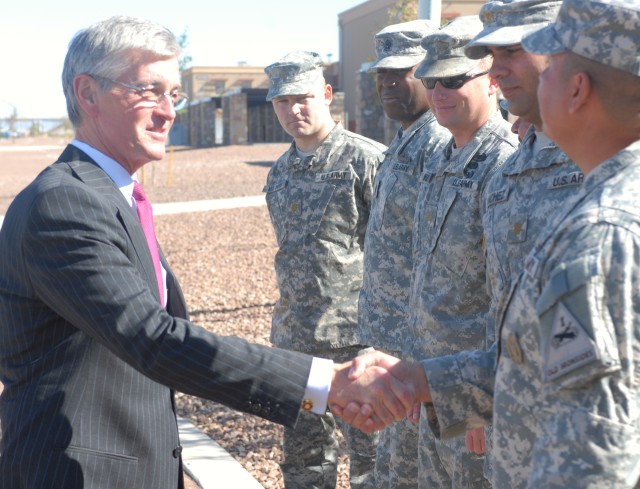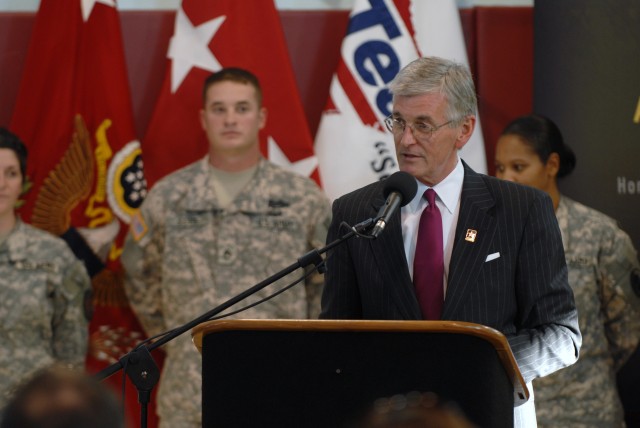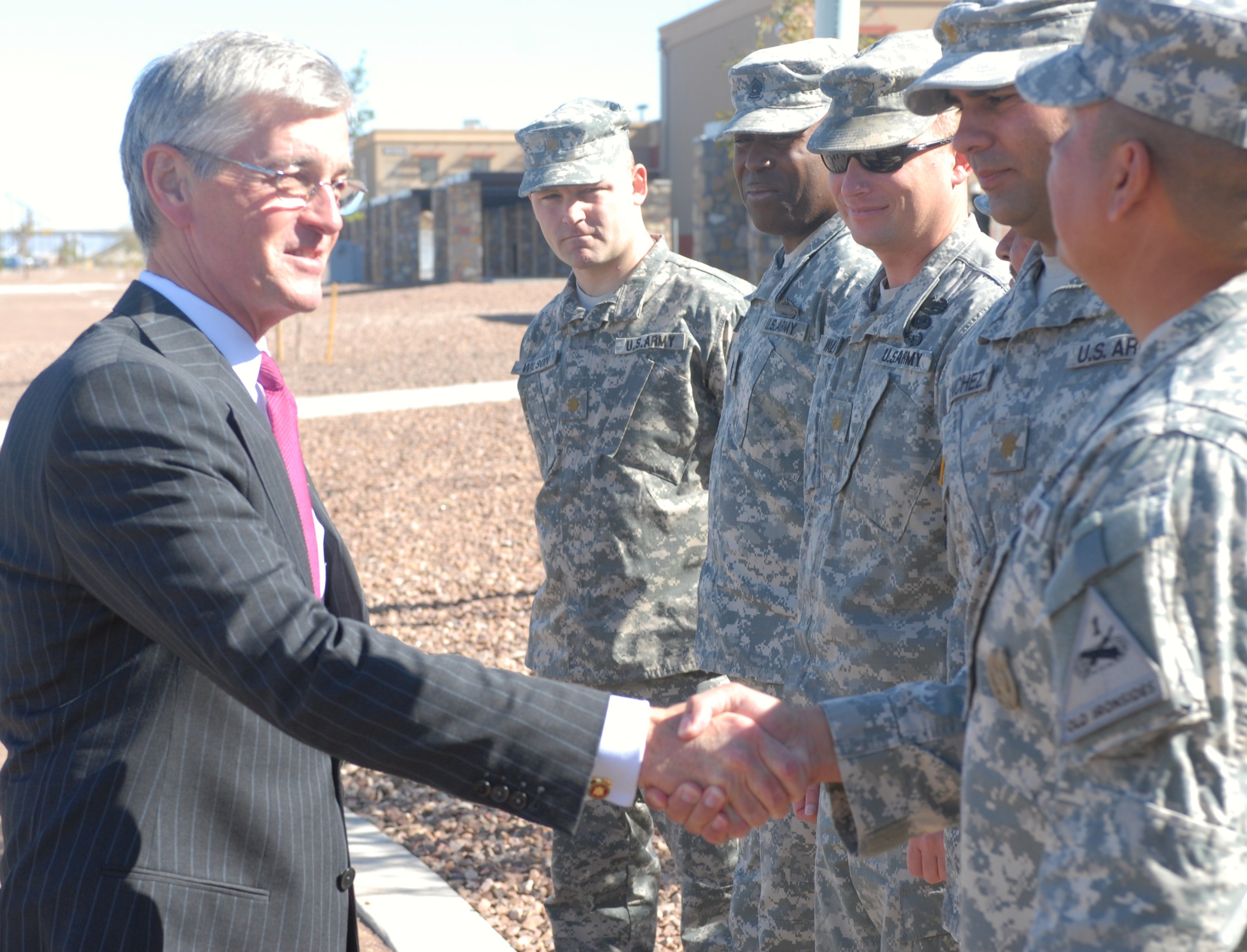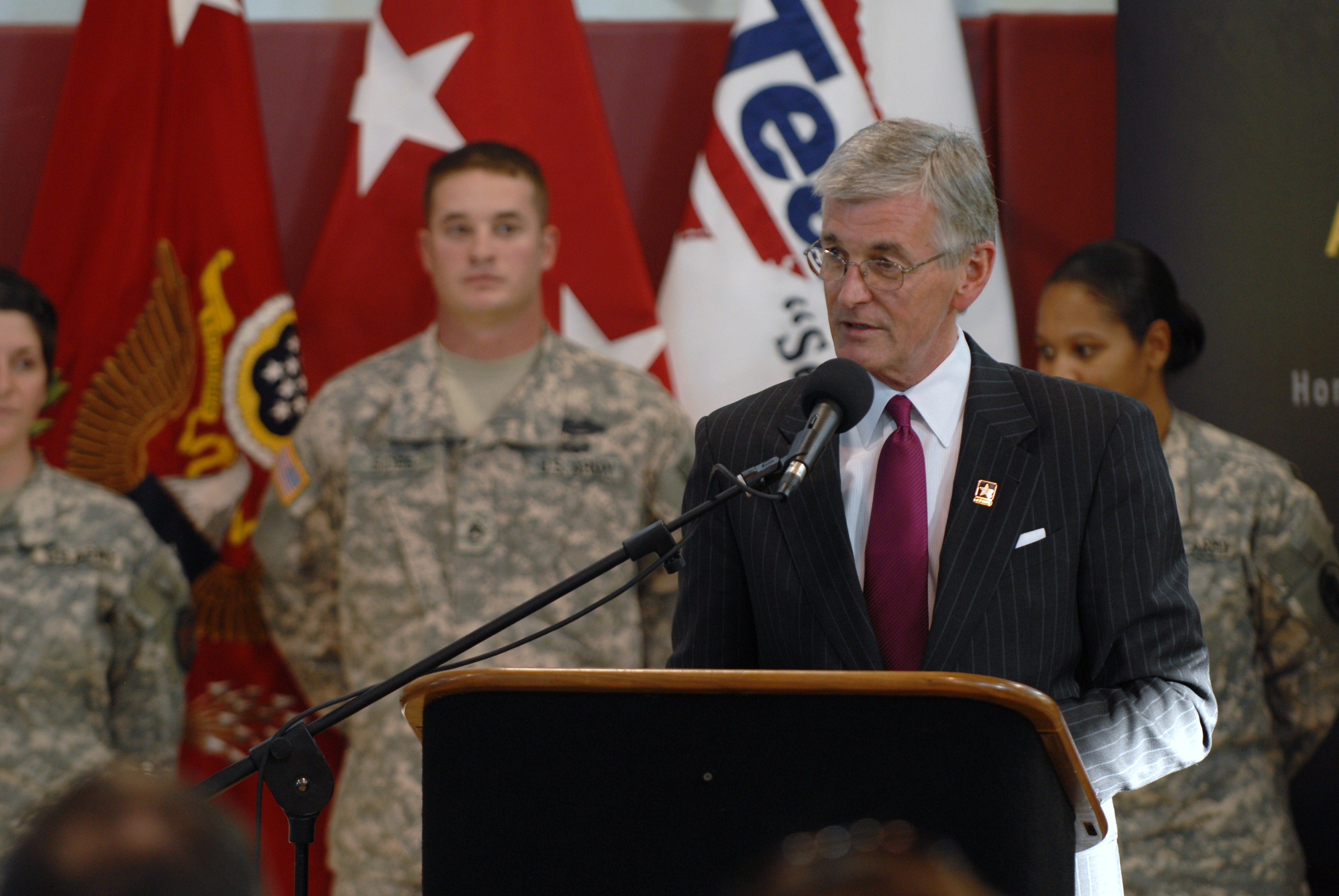FORT BLISS, Texas -- Secretary of the Army John McHugh met with top military leaders Tuesday to discuss the Army Force Generation plan and participate in a re-signing ceremony of the Army Family Covenant here.
Fort Bliss is the first Army installation that McHugh has toured since becoming the 21st Secretary of the Army. Earlier this month, McHugh visited Fort Hood twice in the wake of the shooting there. The decision to tour Fort Bliss, McHugh said, was based on a desire to visit a place that epitomized the future of the Army and a close partnership between the military and civilian community.
McHugh said that he also wanted "to see how our Army Family is doing" and to determine the morale of Soldiers given the pace of deployments and the recent tragedy at Fort Hood.
After his arrival at Biggs Army Airfield, McHugh was escorted by Maj. Gen. Howard Bromberg, Fort Bliss commanding general and Command Sgt. Maj. David Davenport, Fort Bliss command sergeant major, to East Fort Bliss where the secretary saw first-hand the expansive construction and development projects underway.
Approximately $3.3 billion has been committed so far out of $4.6 billion of military construction planned for the installation. Last year, $1 billion of military construction was completed.
East Fort Bliss is the location of three 1st Armored Division brigade combat teams and the future home of the division's headquarters and combat aviation brigade, which is will arrive from Germany in 2011.
The Army Force Generation plan, known as ARFORGEN, is the Army's model for building trained and ready forces to meet the needs of a prolonged conflict but with a balanced approach to deployment and dwell time cycles. It also allows for mission focused training and preparation by putting more emphasis on job-related skills during pre-deployment training.
In line with ARFORGEN, McHugh met with Col. Chris Cavoli, commander 3rd Infantry Brigade Combat Team, 1st AD, to discuss the challenge of standing-up the brigade and to visit several of the newly-constructed brigade facilities. The 3rd IBCT, activated at Fort Bliss in June.
In addition, McHugh welcomed the opportunity to meet with Soldiers and to gain their perspectives. He had lunch with Soldiers at the 1st Heavy Brigade Combat Team dining facility, and later met separately with senior commanders.
In addition, McHugh visited the Warrior Transition Unit and spoke with injured and wounded Soldiers to gain a better understanding of their issues along the road to recovery.
The afternoon finished with the Army Family Covenant re-signing ceremony at the School Age Services Child Development Center. The Army Family Covenant, initially signed at Fort Bliss in 2007, acknowledges the commitment and sacrifice made by Army families and promotes better overall quality of life through improving current family programs and dealing with housing, health care and education issues.
"We use a lot of phrases in the Army -"Army Strong," the "Army Family" - and they have to be more than just meaningful bumper-stickers," said McHugh.
The sentiment must equal action and programs, he said.
"This is a new challenge, a new opportunity for the Army, and we have to step up to meet it," McHugh said.
As a result of the initial Army Family Covenant, child care operating hours were increased and the cost decreased, barracks were renovated to be compliant with the American Disabilities' Act for Soldiers in Warrior Transition, and a new $56 million Warrior Transition Battalion complex is scheduled to be completed in 2011. Additionally, more than 240 battalion-level family readiness support assistants have been hired.
Following the ceremony, McHugh answered reporters' questions about behavioral health care and morale at the installation. He noted the recent hiring of increased numbers of behavioral health counselors and a dedicated child psychologist.
"Mental-health care providers are a very unique commodity, a very unique professional line, and the Army like communities and like the other services, is struggling to come up with the necessary levels of manpower."
McHugh added that the new Comprehensive Soldier Fitness program which puts mental fitness on par with physical fitness "is a good step in the right direction... but we've got a ways to go." He also noted the work of military family life counselors, the on-going efforts of the Army's Suicide Prevention Task Force, and the $5 million study on suicide by the National Institutes of Mental Health in partnership with the Army.
The secretary reinforced the importance of dwell time, the time Soldiers have a home to refresh and renew between deployments.
"We made a commitment to our Soldiers that we're going to do everything within our power to get a 2-to-1 ratio, for every year deployed a minimum of two years back at home station ... those are commitments that will be a challenge to reach," he said, "but we're making progress to keep that promise to our men and women in uniform."




Social Sharing